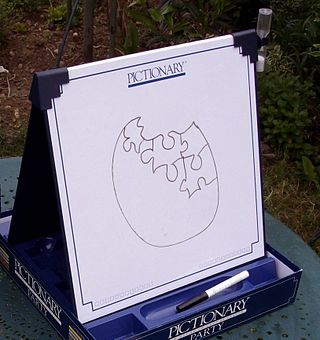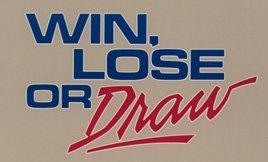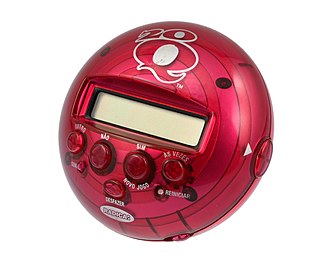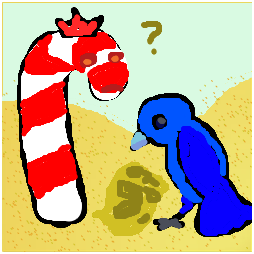
Pictionary is a charades-inspired word-guessing game invented by Robert Angel with graphic design by Gary Everson and first published in 1985 by Angel Games Inc. Angel Games licensed Pictionary to Western Publishing. Hasbro purchased the rights in 1994 after acquiring the games business of Western Publishing. Mattel acquired ownership of Pictionary in 2001. The game is played in teams with players trying to identify specific words from their teammates.

Win, Lose or Draw is an American television game show that aired from 1987 to 1990 in syndication and on NBC. It was taped at CBS Television City, often in Studios 31, 33, and 43 at various times. It was co-produced by Burt & Bert Productions and Kline & Friends for Disney's Buena Vista Television. It has also had two versions on The Disney Channel: Teen Win, Lose or Draw from 1989 to 1992, and a revived version known as Disney's Win, Lose or Draw which aired in 2014. New York described Win, Lose or Draw as "a knockoff" of the board game Pictionary, however, Burt Reynolds and Ed McMahon referred to playing the game at Burt's home during the August 2, 1978 episode of The Tonight Show, with Johnny Carson, three years before Pictionary was created.
iSketch was a drawing browser game that was similar to Pictionary. It was launched by Robert Wahlstedt on June 15, 1999, and was written in Adobe Shockwave. As of April 9, 2019, support for Adobe Shockwave was discontinued, and the game ceased to function correctly and has not been updated.

20Q is a computerized game of twenty questions that began as a test in artificial intelligence (AI). It was invented by Robin Burgener in 1988. The game was made handheld by Radica in 2003, but was discontinued in 2011 because Techno Source took the license for 20Q handheld devices.
Fast Draw was a weekly game show hosted by Johnny Gilbert for syndication from May 25 to Fall 1968 and was distributed by Warner Brothers/Seven Arts Television. The announcer was "Uncle" Fred Scott.
Pictionary is an American television game show which aired in syndication during the 1997–1998 season. The game was based on the board game of the same name where contestants guessed words and phrases based on drawings. Alan Thicke hosted the show with Joe Cipriano announcing. The series was a production of Kline and Friends and was distributed by Worldvision Enterprises.
Pictionary is an American children’s game show based on the picture-drawing board game of the same name. This was the first of three game shows based on the board game, with later editions for adults launched in 1997 and 2022.

Pictionary, taglined The Game of Video Quick Draw, is a video board game developed by Software Creations and published by LJN for the Nintendo Entertainment System. It is based on the board game of the same name. Players may play in up to four teams of unlimited players.
In artificial intelligence, apprenticeship learning is the process of learning by observing an expert. It can be viewed as a form of supervised learning, where the training dataset consists of task executions by a demonstration teacher.
20Q is an American game show based on the online artificial intelligence and handheld computer game of the same name. Licensed to and produced by Endemol USA, it premiered on June 13, 2009, during Big Saturday Night airing on GSN, and is hosted by Cat Deeley of So You Think You Can Dance with the voice of Mr. Q provided by Hal Sparks.

uDraw Pictionary is an art-based video game developed by Page 44 Studios and published by THQ Inc. that players can play on the uDraw GameTablet for the Nintendo Wii. The game is based on the popular board game Pictionary, in which players draw pictures based on clues from a subject and have their teammates guess what specific words the picture is supposed to represent. It was released on November 14, 2010 for the Nintendo Wii game system.

DeepMind Technologies Limited, doing business as Google DeepMind, is a British-American artificial intelligence research laboratory which serves as a subsidiary of Google. Founded in the UK in 2010, it was acquired by Google in 2014 and merged with Google AI's Google Brain division to become Google DeepMind in April 2023. The company is based in London, with research centres in Canada, France, Germany, and the United States.

Broken Picture Telephone, sometimes abbreviated BPT, was a collaborative multiplayer online drawing and writing game invented in 2007, based on the pen-and-paper game Telephone Pictionary.
AlphaGo is a computer program that plays the board game Go. It was developed by the London-based DeepMind Technologies, an acquired subsidiary of Google. Subsequent versions of AlphaGo became increasingly powerful, including a version that competed under the name Master. After retiring from competitive play, AlphaGo Master was succeeded by an even more powerful version known as AlphaGo Zero, which was completely self-taught without learning from human games. AlphaGo Zero was then generalized into a program known as AlphaZero, which played additional games, including chess and shogi. AlphaZero has in turn been succeeded by a program known as MuZero which learns without being taught the rules.
AlphaGo versus Lee Sedol, also known as the DeepMind Challenge Match, was a five-game Go match between top Go player Lee Sedol and AlphaGo, a computer Go program developed by DeepMind, played in Seoul, South Korea between 9 and 15 March 2016. AlphaGo won all but the fourth game; all games were won by resignation. The match has been compared with the historic chess match between Deep Blue and Garry Kasparov in 1997.

The Jackbox Party Pack is a series of party video games developed by Jackbox Games for many different platforms on a near-annual release schedule since 2014. Each installment contains five games that are designed to be played in groups of varying sizes, including in conjunction with streaming services like Twitch which provide means for audiences to participate.
AlphaStar is a computer program by DeepMind that plays the video game StarCraft II. It was unveiled to the public by name in January 2019. In a significant milestone for artificial intelligence, AlphaStar attained Grandmaster status in August 2019.
Iconary is an AI-driven, Pictionary-style online game developed at the Allen Institute for Artificial Intelligence. Publicly released in February 2019, the game is designed to encourage collaborative communication between a human player and the AI player AllenAI. Iconary is the first demonstration of an AI system capable of playing a Pictionary-like game with a human partner.

The Matchbox Educable Noughts and Crosses Engine was a mechanical computer made from 304 matchboxes designed and built by artificial intelligence researcher Donald Michie in 1961. It was designed to play human opponents in games of noughts and crosses (tic-tac-toe) by returning a move for any given state of play and to refine its strategy through reinforcement learning.
Pictionary is an American television game show hosted by Jerry O'Connell that premiered in syndication on September 12, 2022.









